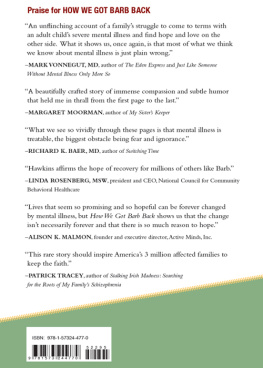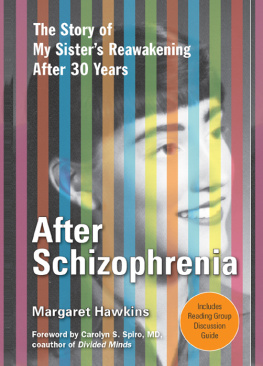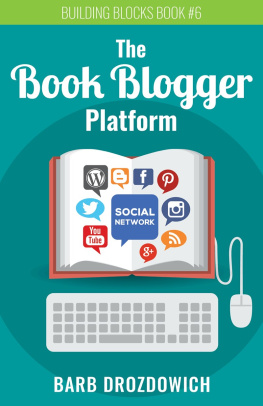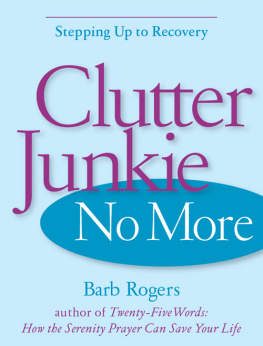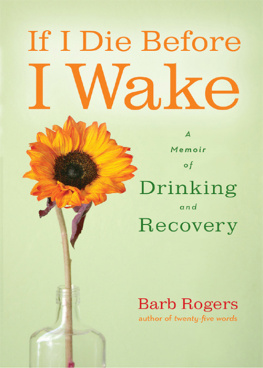From her early 30s to her early 60s, Barbara Hawkins lived cloistered in her family home in suburban Chicago, prisoner of an undiagnosed mental illness. Hearing voices and paralyzed with fear, she was never evaluated, never treated, and refused to leave the house. Until her parents died and her sister Margaret became her guardian.
How does this sort of thing happen?
How We Got Barb Back is Margaret Hawkins' brave and candid exploration of that question as it played out in her familyand a chronicle of what has happened with Barb in the years since their parents' death. As noted psychiatrist and author Carolyn S. Spiro writes in the foreword, Untreated schizophrenia has the power to destroy neural connections in the brain, and often much cognitive and interpersonal functioning, but schizophrenia's power to destroy a person, a relationship, a family, is only as great as we allow it to be. Barb will never get back those 30+ years, but her story shows us that recovery and healing are possible and that we must never give up hope.
Praise for HOW WE GOT BARB BACK
This is an unflinching account of a family's struggle to care for a schizophrenic adult child, Barb, who languished for 30 years as a homebound invalid. Once her parents died the author and her brother were tenacious and determined to try to find help and improve the state of their now 63-year-old sister's life. It is a heartwarming story of a family's struggle to come to terms with severe mental illness and find hope and love on the other side. What it shows us, once again, is that most of what we think we know about mental illness is just plain wrong.
MARK VONNEGUT, MD, author of The Eden Express and Just Like Someone Without Mental Illness Only More So
I began How We Got Barb Back wondering if I had the stamina for a book I knew would be fraught with reminders of my own difficult life with my mentally ill sister. But it turned out to be a beautifully crafted story of immense compassion and subtle humor that held me in thrall from the first page to the last. In countless ways, Margaret Hawkins tailored her own life to suit the needs of her family, especially her beloved, charismatic older sister, but one has to read between the lines to grasp the scope of her sacrifices and her devotion. She tells her story with great tenderness, both for her parents who, like most parents, made grave mistakes and for her sister, Barb, who changed from a progressive, funny, sophisticated role model to a shy and shadowy woman haunted by voices she could not control. Because of Margaret's refusal to give up on her, Barb at last reemerges. I loved this generous memoir, a moving testament to optimism and determination.
MARGARET MOORMAN, author of My Sister's Keeper
In this book, Margaret Hawkins wrenchingly depicts a family crippled by dysfunction and the stigma of mental illness. The loss of Barb to years of psychosis is so sad, but her recovery is inspiring and instructional. What we see so vividly through these pages is that mental illness is treatable, the biggest obstacle being fear and ignorance.
RICHARD K. BAER, MD, author of Switching Time
How We Got Barb Back is an honest and engaging portrayal of the often sudden, always life-changing, onset of mental illnessboth for the person who experiences it and the family and friends who love her. Lives that seem so promising and so hopeful can be forever changed by mental illness, but How We Got Barb Back shows us that the change isn't necessarily forever and that there is so much reason to hope. Readers are brought into this family's world through the eyes of a sibling, a perspective that is seldom written about but immensely important, and are shown how life can be turned upside-down and then brought right back to being right-side up by mental illness, empowerment, and the human spirit.
ALISON K. MALMON, Founder and Executive Director, Active Minds, Inc.
A moving yet down-to-earth portrayal of what's it like to live with a serious mental illness. Hawkins affirms the hope of recovery for millions of others like Barb.
LINDA ROSENBERG, MSW, President and CEO, National Council for Community Behavioral Healthcare
A beautiful tribute to an older sister who hears voices, from the elegant pen of a younger one who never gave up. The steady care on display here is what real love is all about. Their rare story should inspire America's 3 million affected families to keep the faith for the least of our brethren.
PATRICK TRACEY, author of Stalking Irish Madness: Searching for the Roots of My Family's Schizophrenia

Content
First published in 2010 by
Red Wheel/Weiser, LLC
With offices at:
500 Third Street, Suite 230
San Francisco, CA 94107
www.redwheelweiser.com
Copyright 2010 by Margaret Hawkins
All rights reserved. No part of this publication may be reproduced or transmitted in any form or by any means, electronic or mechanical, including photocopying, recording, or by any information storage and retrieval system, without permission in writing from Red Wheel/Weiser, LLC. Reviewers may quote brief passages.
While this is a work of nonfiction, the author has changed a few people's names and associated identifying details to honor their privacy.
ISBN: 978-1-57324-477-0
Library of Congress Cataloging-in-Publication Data available upon request.
Cover and text design: Kristine Brogno
Production Editor: Michele Kimble
Copy Editor: Ali McCart
Proofreader: Nancy Reinhardt
Typeset in Bembo
Printed in the United States of America
MV
10 9 8 7 6 5 4 3 2 1
For my sister, Barbara
And in loving memory of my parents, Barbara Faxon Hawkins and Thomas Rhodes Hawkins
What we do not make conscious emerges later as fate.
CARL JUNG
Foreword
When the galley proofs for this book first arrived, with a request to write a foreword, I had just been fired as my own twin sister's guardian, conservator, and hospital contact person.
People often think I became a psychiatrist to try to help my sister, but the truth is I became a psychiatrist in spite of her. Unlike Barb Hawkins, whom you're about to meet, Pamela has spent decades in and out of hospitals because of schizophrenia. For many years there was no predicting when an emergency call about her would jolt me out of bed. Never as her doctor, you understand, just as next of kin. Recently she's been in-patient for weeks. Last night, I refused to sign her out AMA (Against Medical Advice), and now I'm persona non grata? I don't know whether to be angry or ecstatic.
As it turns out however, the timing is perfect. Without a hospital visit to Pammy looming, I have hours to spend reading this manuscript with the intriguing title, How We Got Barb Back, comfortably ensconced on the sofa.
The pages slip quickly by as I welcome Margaret and Barbara and the whole of the Hawkins clan into my home and I almost finish the memoir in one sitting. I've never met Margaret, and yet I feel I know her like a sister is what I say the first time we talk a few days later. Nevertheless, as I read, the puzzling words home invasion keep popping into my head. The words usually refer to something violent, like breaking and entering. Then I realize--of course, the Hawkins home and family have been invaded by schizophrenia, just as it invaded my own home years ago, as it has invaded homes for millennia, silently unraveling lives and destroying dreams.
Next page
